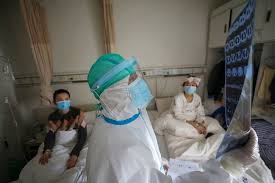England: 20% patients got coronavirus while in hospital for another illness

London: Up to a fifth of patients with Covid-19 in several hospitals contracted the disease over the course of the pandemic while already being treated there for another illness, NHS bosses have told senior doctors and nurses.
Some of the infections were passed on by hospital staff who were unaware they had the virus and were displaying no symptoms, while patients with coronavirus were responsible for the others.
The figures represent NHS England’s first estimate of the size of the problem of hospital-acquired Covid-19, which Boris Johnson last week said was causing an “epidemic” of deaths.
In a national briefing last month on infection control and Covid-19, NHS England told the medical directors and chief nurses of all acute hospitals in England that it had found that 10%-20% of people in hospital with the disease had got it while they were inpatients.
Senior figures at several NHS trusts have confirmed to the Guardian that a senior official at NHS England said in the briefing, held by telephone conference in late April, that the rate of hospital-acquired Covid-19 infections was running at 10% to 20% and that asymptomatic staff had caused some of the cases.
Senior doctors and hospital managers say that doctors, nurses and other staff have inadvertently passed on the virus to patients because they did not have adequate personal protective equipment (PPE) or could not get tested for the virus.
Doctors say that hospital-acquired Covid-19 is a significant problem and that patients have died after becoming infected that way. One surgeon, who did not want to be named, said: “Multiple patients my department treated who were inpatients pre lockdown got the bug and died. Obviously the timeline supports that they acquired it from staff and other patients.”
However NHS sources maintain that the true rate nationally is currently between 5% and 7%. Extensive swab testing at the trusts and analysis of how long patients had been in hospital revealed that between 10% and 20% had become infected during their stay. But the headline figure passed on in the national briefing was skewed because one trust was known to have poor infection control procedures in place.
NHS chiefs remain concerned about the extent of a problem doctors call nosocomial infection. More recent research among staff in the hospitals run by a leading NHS trust in the north of England found that 7% had coronavirus but had no symptoms, and thus posed a risk to patients. Two weeks ago, hospitals began testing all new admissions upon their arrival. While it is also easier now for staff to get swabbed than earlier in the pandemic, problems of access remain.
Johnson last week acknowledged that people had died after contracting Covid-19 in hospital and described the problem as an epidemic.
In a parliamentary debate Laurence Robertson, the Conservative MP for Tewkesbury, told the prime minister that “just a few days ago my father Jim died of coronavirus in hospital. He did not catch the virus in the community; he caught it in the hospital when he went in for another illness.” In a little-noticed reply Johnson referred to the need to tackle “these twin epidemics” of both care home residents and hospital patients dying after picking up the infection while being looked after.
The Guardian reported on 24 March that Marita Edwards had become the first person to die in the UK during the pandemic after contracting coronavirus in hospital. The otherwise-fit 80-year-old went into the Royal Gwent hospital in Newport on 28 February for a routine gallbladder operation but tested positive for Covid-19 on 19 March and died the next day.
A week earlier consultant cardiologist Dr Mark Gallagher told the Guardian about a 79-year-old woman who was admitted to his hospital in London for a non-urgent operation. She was diagnosed with Covid-19, which “she almost certainly acquired on our wards” and was put on a ventilator, but died. About 50 doctors and nurses had treated her, but none had been tested to see if they had the virus, he said.
On 3 March NHS England acknowledged that hospital-acquired Covid-19 was a possibility when it announced that thousands of patients in intensive care would be tested for Covid-19 to try and identify anyone who had caught it there after cases emerged in Europe.
Dr Paul Donaldson, the general secretary of the Hospital Consultants and Specialists Association, a doctors’ trade union, said: “It seems to be a significant number of anecdotal cases that are reported to us that are nosocomial infection of Covid-19 by many doctors throughout the country. They comment that they are aware of cases in their hospitals.”
Donaldson, who is a microbiologist, added: “They are concerned that a greater number of patients are becoming infected than they would like. They and we at the HCSA worry that the inadequacy of PPE might be contributing to this increase in nosocomial infections.”
Dr Alison Pittard, the dean of the Faculty of Intensive Care Medicine, which represents intensive care specialist staff, said: “I’m very concerned that the incidence of [hospital-acquired] infection has gone up during this pandemic. It’s conceivable that asymptomatic staff may unintentionally infect some patients and that could be a mode of transmisison and help explain the rise in intra-hospital infection.”
Pittard said there had been cases of patients being who had been kept alive on a ventilator because of Covid-19 who were then diagnosed with a secondary infection called ventilator-associated pneumonia that they had acquired during their stay.
An NHS spokesperson said they had no reliable figures for the extent of hospital-acquired Covid-19 but would be issuing guidance to hospitals to help them prevent such spread. But, they added: “Research is being undertaken on behalf of the Department of Health and Social Care by Public Health England, SPI-M and other subcommittees of the Scientific Advisory Group on Emergencies to inform infection prevention and control pratices at a local level.
“PHE is conducting a survey to estimate the proportion of asymptomatic healthcare workers that have detectable Sars-Cov-2 virus in their nose and throat to inform development of relevant guidance.”
A senior consultant said hospital-acquired Covid-19 could mean that it might not be safe for the growing number of patients who would be coming into hospital for a planned operation, as the NHS attempts to return to pre-pandemic normal functioning.
They said: “We know from the significant fall in hospital A&E attendances and admissions, many for serious medical conditions, that many people are worried about coming into hospital and catching the virus.
“This shows they are right to be worried; there is real risk. It mirrors the known risk for NHS frontline staff. NHS leadership now have early data to prove this hypothesis.”





